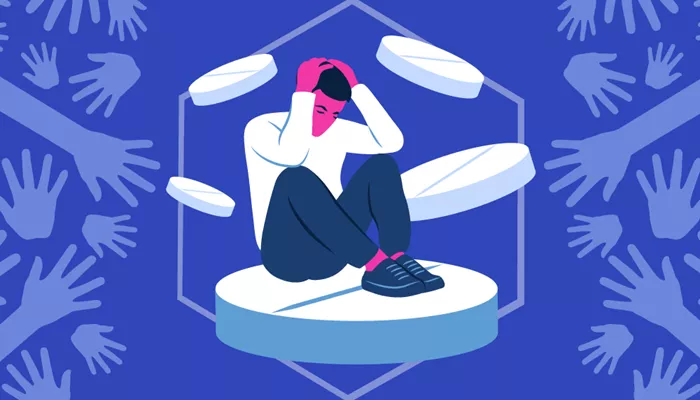Antidepressants are commonly prescribed to manage mental health conditions like depression and anxiety. While they can be effective, stopping or reducing their use can lead to withdrawal symptoms. These symptoms can range from mild to severe and may include mood swings, fatigue, dizziness, and others. Understanding these symptoms and knowing how to manage them is crucial for anyone considering reducing or discontinuing their medication. This article will guide you through how to handle withdrawal symptoms in a safe and manageable way.
Understanding Antidepressant Withdrawal
Antidepressant withdrawal occurs when you suddenly stop taking or reduce the dose of your medication. It happens because your body has become accustomed to the chemical changes antidepressants create in the brain. When the medication is stopped, the brain needs time to adjust. This can cause various withdrawal symptoms, including physical and emotional effects.
Symptoms of Antidepressant Withdrawal
Common symptoms of antidepressant withdrawal include:
Headaches: A frequent symptom as the brain adjusts to the change in chemical levels.
Dizziness: You may feel lightheaded or dizzy as the body adjusts to the lack of medication.
Fatigue: Many people experience extreme tiredness or lethargy.
Irritability and Anxiety: You may feel unusually anxious, irritable, or emotionally unstable.
Nausea or Digestive Issues: Some people experience stomach problems during withdrawal.
Sleep Disturbances: Insomnia or vivid dreams can be common when discontinuing antidepressants.
Flu-like Symptoms: Such as chills, muscle aches, or sweating.
While these symptoms can be uncomfortable, they are usually temporary. However, in some cases, they can persist for weeks. It’s important to consult with a healthcare professional before making any changes to your medication.
How To Help With Antidepressant Withdrawal Symptoms
Gradual Tapering
One of the best ways to avoid severe withdrawal symptoms is to gradually reduce the dosage of antidepressants. This is called tapering. Your doctor can create a tapering schedule for you, which usually involves slowly decreasing the dosage over a period of weeks or even months. This gives your body time to adjust.
Seek Medical Support
Consulting with a healthcare provider is essential when withdrawing from antidepressants. They can monitor your progress and adjust your tapering plan if necessary. In some cases, they may recommend switching to a different medication or providing additional support to manage withdrawal symptoms.
Stay Hydrated and Eat Nutritious Foods
Drinking plenty of water and maintaining a healthy diet can help reduce some withdrawal symptoms. Staying hydrated can help with dizziness and headaches, while foods rich in vitamins and minerals can help replenish nutrients that may be affected by the withdrawal process.
Get Plenty of Rest
Your body and mind will be under stress during withdrawal, so rest is essential. Aim for at least 7-8 hours of sleep each night. Taking naps or practicing relaxation techniques like meditation or deep breathing can also help your body manage the effects of withdrawal.
Exercise
Engaging in regular physical activity can improve your mood and help combat the feelings of anxiety and depression that may arise during withdrawal. Exercise helps release endorphins, which can boost your mood and alleviate some of the withdrawal symptoms.
Try Cognitive Behavioral Therapy (CBT)
Therapy can be beneficial in managing withdrawal symptoms. Cognitive Behavioral Therapy (CBT) helps you understand and change the thought patterns that can contribute to depression and anxiety. It can also provide valuable coping mechanisms as you navigate the withdrawal process.
Monitor Your Mental Health
During withdrawal, it’s crucial to keep track of your mental health. If you notice symptoms of depression, anxiety, or suicidal thoughts, contact your doctor immediately. They can adjust your treatment plan and provide necessary support.
The Role of Support Systems
Having a strong support system during withdrawal is essential. Family members, friends, or support groups can offer emotional encouragement and practical assistance during this time. Talking to others who have experienced antidepressant withdrawal can also be helpful, as they can offer insight into managing symptoms.
When To Seek Professional Help
If the symptoms become overwhelming or persistent, it may be necessary to seek professional help. A healthcare provider may recommend a more structured treatment plan or even consider other therapies to ease the transition.
Conclusion
While withdrawing from antidepressants can be challenging, with the right approach, the process can be managed safely and effectively. Gradually reducing the dosage under the supervision of a healthcare provider, staying hydrated, resting, and seeking therapy are all essential steps in helping ease withdrawal symptoms. If you’re considering stopping antidepressants, talk to your doctor to create a plan that ensures a smooth and supportive transition.
FAQs About Antidepressant Withdrawal
What are the first symptoms of antidepressant withdrawal?
The first symptoms of withdrawal usually include headaches, dizziness, and fatigue.
How long do withdrawal symptoms last?
Withdrawal symptoms can last from a few days to several weeks, depending on the medication and dosage.
Is it safe to stop antidepressants suddenly?
Stopping antidepressants suddenly can cause severe withdrawal symptoms. It’s recommended to gradually taper off under a doctor’s guidance.
Can exercise help with antidepressant withdrawal?
Yes, exercise can help improve mood and reduce anxiety, which can ease some of the symptoms of withdrawal.
Can withdrawal symptoms be avoided?
Gradually tapering off the medication with the help of a doctor can reduce the intensity of withdrawal symptoms.
Are there any medications to ease withdrawal symptoms?
In some cases, doctors may prescribe other medications to manage symptoms, especially if the withdrawal symptoms are severe.
Can therapy help during antidepressant withdrawal?
Yes, therapy, especially Cognitive Behavioral Therapy (CBT), can provide emotional support and coping mechanisms during withdrawal.
Related topics:
- 7 Practical Tips For Easing The Symptoms Of Antidepressant Withdrawal
- Top 8 Antidepressant For Social Anxiety
- What Is The First Line Antidepressant For Adolescents?


